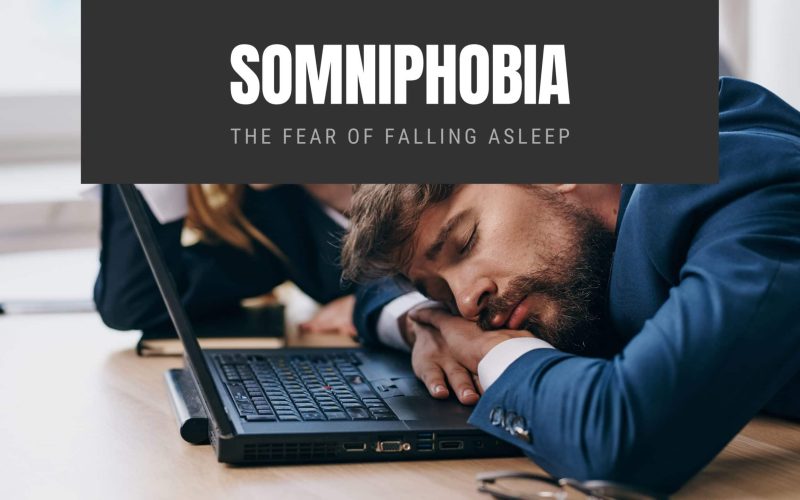Sleeping is a natural phenomenon where one rests periodically while consciousness is suspended. Many people love sleeping; to them, it is refreshing, rejuvenating, and sweet.
However, many sleep disorders and phobias deprive a certain percentage of people of enjoying sleep, and Somniphobia is one of them.
Somniphobia, also known as Sleep anxiety, clinophobia, sleep dread, or hypnophobia, is a phobic condition whereby the mere thought of sleeping or taking a nap causes severe fear to the sufferer.
Like in every phobia, an intense case of somniphobia can adversely affect the holistic health of an individual while disrupting the day-to-day usual activities.
Most times, the sufferer always realizes that their dread for sleep is irrational, yet the individual cannot help it.
Symptoms of Somniphobia
Somniphobia is characterized by symptoms that are a result of the condition affecting psychological health as well as the physical health of the individual.
Even the mere thought of having to sleep may result in the following:
Psychological Symptoms of Somniphobia
These are symptoms manifested as a result of somniphobia adversely affecting the mental and emotional health of an individual:
- Feeling fear and anxiety
- Feeling of distress
- Avoidance behavior by staying up as long as possible to avoid going to sleep
- Panic attacks when the time to sleep has come
- Fear of death and dying
- Trouble focusing
- The feeling of irritability or mood swings
- Memory issues
Physical Symptoms of Somniphobia
These physical symptoms are a result of Somniphobia affecting your physical well-being, and they are:
- Nausea
- Upset stomach
- Persistent anxiety
- Tightness in your chest
- Increased heart rate
- Excess sweating
- Cold flashes
- Hyperventilation
- Difficulty in breathing
- Crying and clinginess in children
- Fear of being left alone
- Fear of death and dying
- Feeling sleepy but cannot sleep
Other symptoms of somnophobia are linked to some coping strategies, which may include:
You can leave the lights on, the television on, or blast music through your ears to distract yourself from sleep.
However, some people opt for severely unhealthy coping techniques, which may include alcohol and substance abuse, to calm the body and reduce the fear they feel.
This may have adverse effects in the long run, coupled with addiction and dependency.
Causes of Somniphobia
Psychologists and researchers are not sure about the precise cause of this condition. However, they believe that sleep disorders contribute immensely to the development of Somniphobia.
Sleep disorders such as:
- Sleep Paralysis
- Nightmare disorder
Sleep Paralysis
This a sleep disorder that people dread; it is frightening because in an episode, you find yourself experiencing some scary hallucination that is like a real-life nightmare but only that you are awake from REM sleep, but you cannot move nor run because you muscles are paralyzed.
This sleep disorder may be unpleasant and scary, but when it becomes recurrent and frequent, you may not look forward to sleeping again.
Nightmare Disorder
Nightmare disorder results in nightmares that seem so real that they most times disrupt your day because you are absorbed in the previous nightmare episode, and you are terrified about having them again.
When this nightmare is so persistent that you expect it even as soon as you have your eyes shut, then you are most likely to develop this psychological condition because you do not want to go through that again.
However, other factors are believed to cause this psychological condition;
Having episodes of post-traumatic stress disorder (PTSD) about a traumatic past event can equally lead to nightmare disorders, as well as Somniphobia.
The fear of dreadful things occurring while you are asleep such as rape and other sexual assaults, burglary, fire outbreak, and other worrisome incidents that are likely to occur, can keep you awake because you are too scared to sleep.
When these negative thoughts arise frequently you have more chances of developing Somniphobia.
Again, for some reason, some people are scared that they could die in their sleep, and when they do not deal with such thoughts and beliefs, then it will eventually result in Somniphobia.
However, experts believe that there are possibilities of developing Somniphobia without a precise reason, or you can not remember when and why you have Somniphobia.
Diagnosis of Somniphobia
If you suspect that you might be having Somniphobia, then you are advised to see a mental health expert for proper diagnosis, support, and treatment.
Phobias are highly associated with fear and anxiety; thus, it is typical to diagnose Somniphobia if your fear of sleep causes you grave distress in your usual way of living.
Your diagnosis may come out favorable to somniphobia if your fear of sleeping does the following:
- It affects the quality of your sleep.
- Adversely affects physical or psychological health
- Results in haunting anxiety
- Causes distress relating to sleep
- Leads to the problems at work, school, or in your personal life
- Negatively affects your interpersonal and intrapersonal relationship
- It has lasted more than six months.
- Makes you avoid sleep as much as possible
Treatment of Somniphobia
Most phobic resort to avoiding their source of fear, but in the case of Somniphobia, avoiding sleep forever is impossible because your body needs it, and it will get to a point where your consciousness succumbs.
Your body falls asleep, but this may be unrestful as you are likely to keep on waking up troubled and going back to sleep. This phobia is considered extreme and needs to be treated as soon as possible.
Treatments may be applied according to the inherent cause of somniphobia. For example, if you have Somniphobia because of your sleep disorder, then it is only wise to deal with the source of the problem, which, in this case, is the sleep disorder.
Solving sleep disorders may help resolve your homophobia. However, in most cases, exposure therapy is considered the best treatment option for somniphobia.
Exposure Therapy
Using exposure therapy, your trained therapist may set up stages where you will be gradually exposed to your source of fear under his expertise and care within a controlled environment to desensitize you from feeling threatened at each encounter with your object of fear.
This may involve a simple discussion about your condition and the application of many relaxation techniques to relax you enough to fall asleep.
This will be followed by exposing you to images of sleeping people who seem to look comfortable and enjoy sleep.
After which comes a brief talk to assure you that you have nothing to worry about. Then, you are encouraged to sleep, probably with a loved one to ensure that you are safe.
Cognitive-behavioral Therapy (CBT)
In CBT, your therapist works with you to help you identify and overcome your fears. You will be taught how to challenge and change the identified negative thought patterns into positive ones when you encounter them so that you feel less distressed by them.
These negative thought patterns might be related to sleep itself or the specific fear that causes anxiety around sleeping. Another technique that your therapist may advise you to adopt is “Sleep restriction.”
Sleep restriction is a way of conditioning the body to develop better sleeping patterns. This is created by sleeping and waking up at a particular time, regardless of how much sleep you get.
This approach can be used in combination with CBT to treat somniphobia.
Medication
Drugs cannot be used to cure a phobia, but at least they give symptoms relief to the sufferer while they go through therapy.
Your doctor may prescribe medicines like benzodiazepines or beta-blockers for occasional administration or short-term use.
Benzodiazepines are sedatives that can help ease anxiety, as well as Beta-blockers. For instance, they can help maintain blood pressure and heart rate and also keep you calm so that you don’t fidget or tremble.
However, long-term use of benzodiazepines can make you addicted or dependent on them, which may trigger withdrawal symptoms when stopped abruptly.
This is only used for a short time to help you sleep well while you go through therapy and have your phobia resolved.
Conclusion
Somniphobia is the morbid fear of sleep that triggers anxiety even at the thought of getting some sleep. This disrupts your sleeping patterns, makes you have troubled periods of sleep, or stops you from sleeping.
Lack of sleep is associated with many health issues that can disrupt a healthy lifestyle and affect health as a whole.
Therefore, if you feel that you may have somniphobia, you should contact a medical health professional to have you diagnosed and treated as soon as possible. Additionally, you might want to check out our friends from SNOOZE , who wrote a similar article with more details.
Kindly leave a comment below.
References;
- Gooley JJ, et al. (2011). Exposure to room light before bedtime suppresses melatonin onset and shortens melatonin duration in humans; DOI








